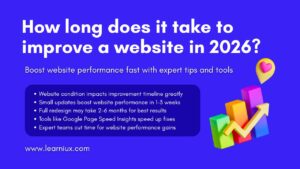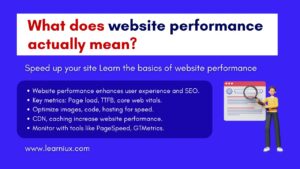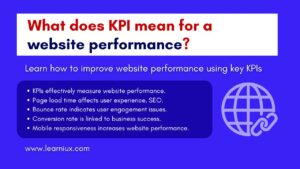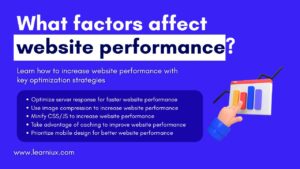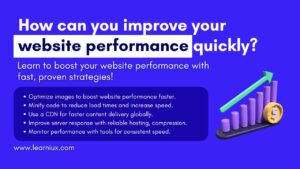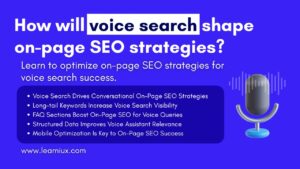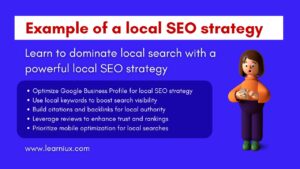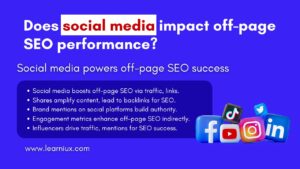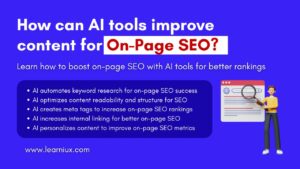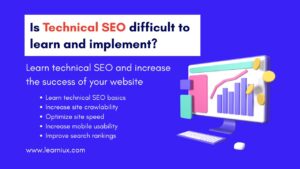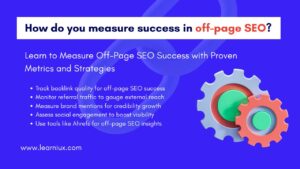Introduction
Search Engine Optimization (SEO) is an important process in digital marketing that helps websites to achieve high rankings on search engines. Over the past few years, SEO technology has been constantly evolving, and artificial intelligence (AI)-based tools have revolutionized it. Traditional SEO tools have long played a key role in this field, but the advent of AI SEO tools has increased the speed, accuracy, and efficiency of this process. In this article, we will take a detailed look at the key differences between AI SEO tools and traditional tools, their benefits, limitations, and future prospects. This article will guide businesses and digital marketers in choosing the right tool to improve their SEO strategies.

What are AI SEO Tools
AI SEO tools are software tools based on artificial intelligence (AI) and machine learning (ML) technologies that automate and make the SEO process more efficient. These tools analyze large amounts of data quickly, adapt to search engine algorithms, and provide users with accurate, data-driven suggestions. AI SEO tools help improve content optimization, technical SEO, and backlink strategies by analyzing search intent, keyword trends, and user behavior in depth.
Key Features of AI SEO Tools
Here are some of the key features that make AI SEO tools different from traditional tools:
Automated Data Analysis
AI SEO tools perform real-time analysis of large datasets. For example, these tools instantly assess search volume, keyword difficulty, and competitor analysis. This helps marketers make faster decisions and implement their strategies immediately.
Understanding Search Intent
AI SEO tools use natural language processing (NLP) and semantic analysis to understand users’ search intent. For example, if a user is searching for “best smartphone,” AI tools suggest content based on questions, subtopics, and user expectations related to that keyword, rather than focusing solely on the keyword.
Predictive Analytics
AI tools use predictive models to predict future search trends and keywords. This helps businesses plan their content strategies in advance and stay ahead of the competition.
Voice Search and Mobile Optimization
With the increasing popularity of voice search and mobile search, AI SEO tools offer specific suggestions for natural language queries and mobile-friendly content optimization. These tools suggest long-tail keywords and conversational content for voice search queries.
Personalized Suggestions
AI SEO tools offer personalized suggestions based on the user’s specific needs and goals. For example, if a business is focusing on local SEO, AI tools suggest strategies for local keywords and Google My Business optimization.
What are Traditional SEO Tools
Traditional SEO tools are manual or semi-automated software tools used for keyword research, backlink analysis, website audits, and ranking tracking. Tools like Google Keyword Planner, older versions of SEMrush, Ahrefs, and Moz fall into this category. These tools are useful for data collection and basic analysis, but they rely heavily on human intervention and manual processes.
Key Features of Traditional Tools
Some of the key features of traditional SEO tools are as follows:
Manual Keyword Research
Traditional tools provide data for users to select and analyze keywords themselves. For example, Google Keyword Planner shows users the search volume and competition for keywords, but it requires manual filtering and analysis.
Limited Data Processing
Traditional tools are limited in handling large datasets. This makes them time-consuming to use for large projects. For example, users have to check the data themselves to analyze the backlinks of competing websites.
General Suggestions
Traditional tools provide general suggestions for content optimization, such as improving meta tags or increasing keyword density. However, these suggestions are not personalized to the specific needs of the user.
Data Reports
Traditional tools focus more on generating data reports. For example, SEMrush or Ahrefs provide detailed reports on a website’s ranking, backlinks, and technical errors, but they require technical knowledge to use.
Key Differences Between AI SEO Tools and Traditional Tools
Let’s consider the following points to understand the differences between AI SEO tools and traditional tools:
Efficiency and Speed
AI SEO tools use machine learning and automated processes to analyze data faster. For example, AI tools can analyze thousands of keywords in a matter of seconds and provide optimization suggestions for them. In contrast, traditional tools take longer to collect and analyze data, as they require human intervention.
Data Accuracy
AI SEO tools provide more accurate results thanks to predictive models and real-time data analysis. For example, AI tools instantly identify changes in search engine algorithms and suggest strategies accordingly. Traditional tools rely on limited data and may experience delays in adapting to algorithm updates.
User Experience
AI SEO tools provide users with a personalized and easy-to-use experience. These tools are useful for beginners and professionals alike, as their interfaces are simple and the instructions are clear. Traditional tools provide generic instructions, which can be difficult for beginners to use.
Scalability
AI SEO tools are capable of handling large amounts of data and multiple projects. For example, if a business needs to optimize multiple websites or a large number of keywords at once, AI tools can handle this process efficiently. Traditional tools are suitable for small projects, but they are less efficient for large projects.
Automation
AI SEO tools automate processes such as content generation, keyword research, and technical audits. For example, AI tools can automatically create meta descriptions for blog posts or provide suggestions to improve the loading speed of a website. Traditional tools require manual input and processing for this.
Benefits of AI SEO Tools
AI SEO tools offer businesses and digital marketers a number of benefits that keep them ahead of the competition. Here are some of the key benefits:
Time Saving
AI SEO tools save a lot of time by automating processes. For example, processes like keyword research, content optimization, and competitor analysis are completed in a much shorter time compared to traditional tools.
Adapting to Search Trends
AI SEO tools quickly adapt to changes in search engine algorithms and new trends. For example, Google’s algorithm updates are putting more emphasis on voice search and mobile search. AI tools provide suggestions to optimize content according to these changes.
Ease of Use
The interfaces of AI SEO tools are easy for beginners and professionals. These tools explain complex data to users in simple language and provide personalized suggestions based on their needs.
Competitor Analysis
AI SEO tools help users understand their strategies and create better strategies by analyzing their competitors’ data. For example, AI tools analyze competitors’ top-ranking keywords, backlinks, and content strategies.
Cost-effective
AI SEO tools are cost-effective in the long run, as they reduce manual work and deliver faster results. This allows businesses to use their marketing budget more effectively.
Limitations of Traditional SEO Tools
While traditional SEO tools have been useful for many years, they have some limitations:
Limited Automation
Traditional tools rely less on automated processes. For example, keyword research, content optimization, and website audits require users to manually examine data and make decisions.
Outdated Technology
Traditional tools are limited in adapting to rapid changes in search engine algorithms. For example, Google’s new updates are putting more emphasis on search intent and user experience, but traditional tools are not fully adapted to this.
Complex Process
Traditional tools require technical knowledge to use. Beginners may find them difficult to use, as they have to analyze data and understand the meaning of the instructions.
Costly Process
Using traditional tools for large projects can be costly, as they require more time and human resources. For example, analyzing a large number of keywords or backlinks requires additional tools and expertise.
The Future of AI SEO Tools
AI SEO tools are constantly evolving and will continue to grow in importance in the future. The following are some of the trends shaping the future of AI SEO tools:
Natural Language Processing (NLP)
AI SEO tools are using natural language processing to perform deeper analysis of search queries and user intent. This will help make content more natural and user-centric.
Voice Search Optimization
With the increasing popularity of voice search, AI SEO tools are focusing on conversational keywords and question-based content. For example, AI tools suggest conversational answers for queries like “what is the best restaurant?”
Chatbots and AI Assistants
AI SEO tools are integrating with chatbots and AI assistants, which improves the user experience on websites and has a positive impact on search rankings.
Data-driven decisions
AI SEO tools use predictive analytics and machine learning to make data-driven decisions. This helps businesses plan their SEO strategies in advance and stay ahead of the competition.
Advances in Technical SEO
AI tools automatically analyze technical issues on websites, such as page loading speed, mobile friendliness, and crawling errors. This helps websites rank better on search engines.
Combining AI SEO Tools with Traditional Tools
Some businesses use AI SEO tools and traditional tools together, allowing them to get the benefits of both tools. For example, traditional tools can be used for data collection and basic reporting, while AI tools can be used for data analysis and optimization. This hybrid approach helps businesses make their SEO strategies more effective.
Case Study
An e-commerce website used AI SEO tools and traditional tools together. They used traditional tools for keyword research and backlink analysis, while AI tools were used for content optimization and search intent analysis. This resulted in a 30% improvement in their website’s search rankings and a 25% increase in organic traffic.
Conclusion
The difference between AI SEO tools and traditional SEO tools lies in efficiency, accuracy, automation, and ease of use. AI SEO tools are more effective than traditional tools due to automated analysis, predictive models, and personalized suggestions. While traditional tools are still useful for certain processes, AI tools are better able to adapt to the changing landscape of search engine algorithms and keep businesses ahead of the competition. In the future, the importance of AI SEO tools will increase further, and businesses will need to include these tools in their SEO strategy. A balanced use of AI and traditional tools will greatly help businesses achieve their digital marketing goals.
FAQs
What is the main difference between AI SEO Tools and traditional SEO tools?
AI SEO tools use artificial intelligence and machine learning to analyze data quickly and accurately, while traditional tools rely on manual processes. AI tools provide personalized suggestions by understanding search intent and promoting automated optimization. Traditional tools are useful for keyword research and backlink analysis, but they require more human intervention. AI tools quickly adapt to search trends through real-time data analysis and predictive models. In contrast, traditional tools are slow to adapt to changes in search engine algorithms. AI tools are able to handle large datasets, which is beneficial for large projects. Traditional tools are more suitable for small projects. AI tools provide special suggestions for voice search and mobile optimization. Overall, AI SEO tools outperform traditional tools in terms of efficiency, accuracy, and ease of use.
Are AI SEO Tools Suitable for Beginners?
Yes, AI SEO tools are highly suitable for beginners because their interfaces are simple and user-friendly. These tools explain complex data in simple language and provide personalized suggestions. For example, beginners may find it difficult to choose keywords or optimize content, but AI tools automate this process. They provide clear guidance to improve content based on search intent and trends. In contrast, traditional tools require technical knowledge, which can be difficult for beginners. AI tools give beginners quick results to improve their website rankings. They help them adapt to new trends such as voice search and mobile optimization. Therefore, novice digital marketers or small business owners find AI tools easy and effective to use. Their automated feature saves time and reduces the chances of errors.
Why are traditional SEO tools still used?
Traditional SEO tools are still used because they are reliable and familiar for specific tasks. For example, tools like Google Keyword Planner and Ahrefs provide detailed data for keyword research and backlink analysis. These tools are useful for generating data reports and conducting basic SEO audits. Some businesses want more control over their processes than traditional tools offer through manual analysis. In contrast, AI tools are more automated, which some experienced marketers may find less flexible. Traditional tools are cost-effective for small projects or specific tasks. Since they have been in use for a long time, many professionals are familiar with their methodology. However, they have limitations in adapting to changing search algorithms. Therefore, some businesses use a combination of AI and traditional tools.
How are AI SEO Tools Useful for Voice Search?
AI SEO tools are extremely useful for voice search optimization because they use natural language processing (NLP). They focus on conversational queries and long-tail keywords, which are common in voice search. For example, AI tools suggest natural and conversational content for queries like “what is the best restaurant?” They help create content that directly answers users’ questions by understanding search intent. AI tools perform real-time analysis of voice search trends and suggest strategies accordingly. In contrast, traditional tools do not offer specific optimization for voice search. AI tools also emphasize mobile-friendly content and snippet optimization, which is important in voice search results. Therefore, they help businesses get more organic traffic from voice search. Their automated feature makes it easy to create content for voice search.
How much time does using AI SEO Tools save?
AI SEO tools save a lot of time by automating processes. For example, AI tools complete processes like keyword research, content optimization, and competitor analysis in minutes. Traditional tools can take hours or days to complete these same processes, as they require manual input. AI tools provide fast suggestions through real-time data analysis and predictive models. They automatically generate meta tags, headlines, and content structure, which reduces content creation time. In contrast, traditional tools spend more time on data collection and require human intervention for analysis. AI tools are capable of handling large datasets, which saves time for large projects. Therefore, businesses can manage their SEO efforts more efficiently. Overall, AI tools can save 50-70% of time compared to traditional tools.
How expensive are AI tools compared to traditional SEO tools?
The cost of AI SEO tools depends on their features and provider, but they tend to be cost-effective in the long run. Traditional tools are usually based on monthly or annual subscriptions and can be priced lower due to limited features. AI tools may seem more expensive initially, but they save time and resources due to automated processes and faster results. For example, AI tools reduce manual work, which reduces the need for additional staff or experts. Traditional tools take up more resources and time for larger projects, which increases the overall cost. AI tools increase ROI (return on investment) through personalized suggestions and predictive analytics. Some AI tools offer affordable plans for small businesses. Therefore, AI tools are more cost-effective in the long run. Businesses should choose a tool according to their needs and budget.
How are AI SEO Tools Useful for Local SEO?
AI SEO tools are extremely useful for local SEO because they perform in-depth analysis of local search trends and user behavior. They provide suggestions for local keywords, Google My Business optimization, and location-based content. For example, AI tools suggest optimized content for local search queries such as “coffee shops near me.” They analyze local competitors through real-time data analysis and suggest better strategies. AI tools guide you in managing local backlinks and online reviews. In contrast, traditional tools provide generic data for local SEO and require manual analysis. AI tools help you rank higher in local search engine results. Their automated features make local SEO strategies easy and efficient. This makes it easier for small businesses to reach local customers.
How do AI SEO Tools help in content creation?
AI SEO tools help a lot in content creation with their automated and data-driven approach. They suggest content ideas and structure based on search intent and keyword trends. For example, AI tools automatically generate headlines, meta descriptions, and content outlines for blog posts. They use natural language processing to create user-centric and search engine-friendly content. AI tools provide suggestions to improve the readability, keyword density, and semantic optimization of content. In contrast, traditional tools only provide keyword and backlink data, which leaves content creation manual. AI tools help you create better content by analyzing your competitors’ content. They provide suggestions tailored to voice search and mobile-friendly content. This makes content creation fast, efficient, and effective.
What are the limitations of traditional SEO tools?
Traditional SEO tools have some major limitations that limit their effectiveness. They rely on manual processes, which take up a lot of time for data analysis and optimization. For example, for keyword research and backlink analysis, users have to manually check the data. Traditional tools are slow to adapt to rapid changes in search engine algorithms. They do not offer special optimization for new trends such as search intent or voice search. They require technical knowledge, which makes it difficult for beginners. Their ability to handle large datasets is limited, which makes large projects time-consuming. Traditional tools provide general suggestions, which are not personalized. Due to this, businesses have to adopt AI SEO tools to stay ahead of the competition.
Can AI SEO Tools and traditional tools be used together?
Yes, AI SEO tools and traditional tools can be used together, and this approach is beneficial for many businesses. Traditional tools are useful for data collection, keyword research, and backlink analysis. For example, Ahrefs or SEMrush provide detailed data reports, which can be used for strategic planning. On the other hand, AI tools automatically analyze this data and provide personalized suggestions. AI tools suggest strategies that are tailored for content optimization, search intent analysis, and voice search. This hybrid approach allows businesses to get the benefits of both tools. For example, after collecting data through traditional tools, it can be analyzed and optimized through AI tools. This makes the SEO strategy more effective and comprehensive. Businesses should balance both tools according to their needs and goals.























